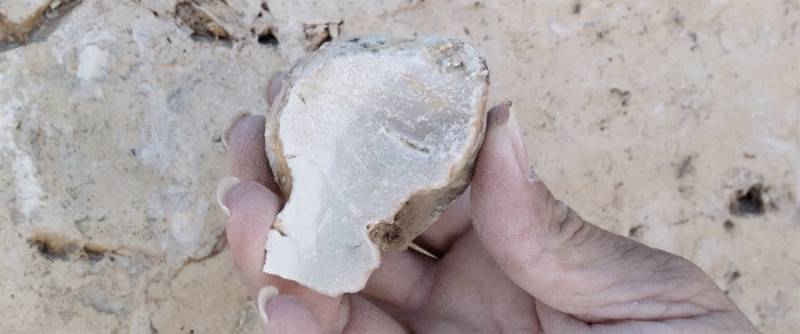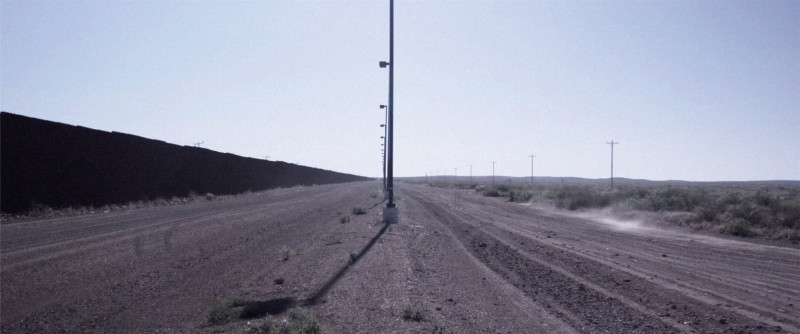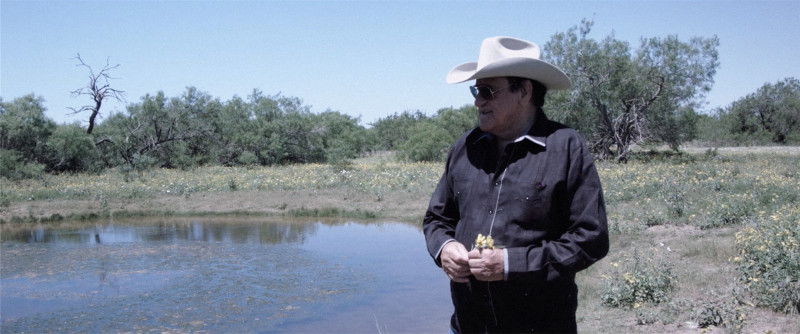At the bottom of the Sea
Spaces expand or disappear. Oceans become deserts. Rock erodes to sand and dust. Humans, with their short lifespans, hardly notice the environmental changes time scrawls across the earth. We are constantly moving from one place to another, fleeing hunger, war or the forces of nature, but also driven by a sense of longing that pulls us forward. AT THE BOTTOM OF THE SEA traces forms of migration, interweaving them with geological and archaeological cartographies.
DIRECTOR'S STATEMENT
Originally we wanted to make a film about “landscape.” So what makes a landscape? How was the landscape created? What was there before? What will it turn into? We were concerned with the history of millions of years of Earth-time, in contrast with relatively temporary forms of being. Exactly those kinds of stories landscapes tell.
West Texas, for example, was once a seabed; the largest fossil reef on earth is here, the limestone tells of it. And of course the gigantic oil deposit in Texas is connected to it. What you might associate with Texas in general and also in Europe - as well with its population and ownership structure - is somehow closely related to the geological situation of the region. To its geological change, to traces, sediments and time layered deep inside. To inscriptions in the exterior and interior of the landscape, designing its form, surface and structure. And the landscape in turn shapes and forms people. Their socio-cultural, regional specificity, but also life itself.
The first humans who populated the American continent from Asia in the last ice age found fertile plains in the southwest; today there is a desert in large parts. We have searched for these stories. Our film soon became a document of a search for clues, of traces of constant transformations, of a cyclic becoming and passing, of vertical deposits and horizontal movements. All this tells of the fact that no element remains the same, that all life moves on and on.
Another trace that crosses this landscape is also a politically highly explosive one. A 3144 kilometre long line that has remained more or less unchanged for just over 160 years. Sometimes it can be clearly seen, sometimes not. The border between Mexico and the United States cuts the landscape into two parts. There are many interest groups who want to make this line insurmountable. Interestingly, in around 1820, there was an opposing political effort to stop migration to the south. From a geological perspective, this idea of demarcating borders seems as ridiculous as it is grotesque - landscapes timelessly form, change and shift horizontally, just as the first settlers' treks did themselves. A movement on which the founding myth of the United States is ultimately based.
American history is just one example of the fact that we humans have been on the move since the beginning of our existence, ever since we stand upright and walk. Even if people always had the need for safety and security, to protect them from whatever is bad, we look back on a long human history of longing to move on in order to survive, but also to experience new spaces or to leave something behind; and all the more in view of the American promise of freedom and individual happiness, which is already constitutionally inscribed in the identity of an entire nation. From the temporal-spatial bird's-eye perspective of Earth's history, the border is a random line drawn by authoritarian power, economic and territorial interests. And again and again overcome by the instincts and longings of life itself.
Documentary
49 minutes | Germany 2020
WHO
script, direction, camera, montage KARSTEN KRAUSE co-author & sound recording DAN BOEHL music BRIAN WILLEY, THE BLACK DRUMSET colors TIM LIEBE sound design & sound mix JAKOB SPENGEMANN dramaturgical advice BIRGIT GLOMBITZA graphics STEFFEN GOLDKAMP
funded by FFA Filmförderanstalt supported by FILMFÖRDERUNG HAMBURG SCHLESWIG-HOLSTEIN & GERMAN FILMS
SCREENINGS
- International Film Festival Rotterdam, The Netherlands 2020
- Dokumentarfilmwoche Hamburg, Germany 2020
- Imagine Science Film Festival, United States 2020
- Nordische Filmtage Lübeck, Germany 2020
- Labocine 2020
- MIC Istmo, Mexico 2021
-
STRANDZHA
a film by
Pepa Hristova -
DER FLECK
(SKILL ISSUE)
a film by Willy Hans -
DIE STIMME DES INGENIEURS
(the engineer's voice)
a short film by André Siegers -
PAPILLON
a short film by
Francesca Bertin -
STUPOR
a short film by
Leonie Kellein -
REPRODUKTION
a film by
Katharina Pethke -
LA EMPRESA
a film by
André Siegers -
HUMAN FLOWERS OF FLESH
a film by
Helena Wittmann -
Olanda
a film by
Bernd Schoch -
GESTERN, ICH DENKE AN MORGEN
a film by
Tom Otte -
Jedermann und ich
a film by
Katharina Pethke -
Landjaeger
a film by
Lilli Thalgott & Mignon Remé -
Drift
Helena Wittmann's
first feature -
Was wahrscheinlich passiert wäre, wäre ich nicht zu Hause geblieben
Willy Hans' recent short
which Fünferfilm co-produced -
Piqueuses
by Kate Tessa Lee
and Tom Schön -
Sec Rouge
by Kate Tessa Lee
and Tom Schön -
Arrangement of Skin
a short film
by Karsten Krause




